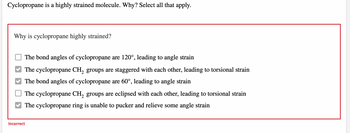
Chemistry
10th Edition
ISBN: 9781305957404
Author: Steven S. Zumdahl, Susan A. Zumdahl, Donald J. DeCoste
Publisher: Cengage Learning
expand_more
expand_more
format_list_bulleted
Concept explainers
Question

Transcribed Image Text:Cyclopropane is a highly strained molecule. Why? Select all that apply.
Why is cyclopropane highly strained?
The bond angles of cyclopropane are 120°, leading to angle strain
The cyclopropane CH₂ groups are staggered with each other, leading to torsional strain
The bond angles of cyclopropane are 60°, leading to angle strain
The cyclopropane CH₂ groups are eclipsed with each other, leading to torsional strain
The cyclopropane ring is unable to pucker and relieve some angle strain
Incorrect
Expert Solution
This question has been solved!
Explore an expertly crafted, step-by-step solution for a thorough understanding of key concepts.
This is a popular solution
Trending nowThis is a popular solution!
Step by stepSolved in 2 steps with 1 images

Knowledge Booster
Learn more about
Need a deep-dive on the concept behind this application? Look no further. Learn more about this topic, chemistry and related others by exploring similar questions and additional content below.Similar questions
- I would like to you help me with my homework because I struggledarrow_forwardMake sure when you draw the Lewis structure you show which element has the 1- charge. Make sure the rest have the ideal # of bondsarrow_forward8. Draw the line bond structural formula, the condensed structural formula, and the skeletal structural formula for 2-pentene. Line bond structure: Condensed structure: Skeletal formula: 9. Draw the line bond structural formula, the condensed structural formula, and the skeletal structural formula for 2-methyl-3-heptene. Line bond structure: Condensed structure: Skeletal formula:arrow_forward
- 1) Listen What is the molecular geometry of each carbon atom in an alkane? Linear Tetrahedral O Trigonal planar Trigonal pyramidal. Octahedralarrow_forwardNow write the condensed formulas for the following bond-line structures.arrow_forwardCCI4 QUESTION 8 In the answer box, provide the IUPAC name for the following alkane. (Remember spelling and formatting count). CH3 CH, CH3 CH,CHCHCHCH,CH; CH,CH, QUESTION 9 For the carbon indicated with an arrow, select the correct hybridization, shape based from the hybridization, andarrow_forward
- What are constitutional isomers? molecules with the same molecular formula but one triple bond instead of two double bonds molecules with the same structure but different substitutes molecules with the same structural formula but different spatial arrangements of atoms molecules with the same molecular formula but different structuresarrow_forwardAnswer all correctly completely this is complete questionarrow_forwardGive typed all subparts otherwise leave itarrow_forward
- Indicate the electron pair geometry and the molecular geometry for each of the six compounds. Compound :0=0-0: :C-S-CI: :CI-Be-Ci: CI-S-CI 0: :0=s=0: 0: H H-C-H 1 H ||||||| Electron pair geometry Molecular geometryarrow_forwardDraw the bond-line formula for each of the following condensed structural formulas.These may go beyond the simple explanations above but you can imply the connectivity based on the atoms’ desired valence. a)(CH3)3CCH2CH3 b)(CH3)2CHOH c)(CH3)2CHOHarrow_forwardConvert this molecule into a skeletal structure and give the IUPAC name. See the image belowarrow_forward
arrow_back_ios
SEE MORE QUESTIONS
arrow_forward_ios
Recommended textbooks for you
 ChemistryChemistryISBN:9781305957404Author:Steven S. Zumdahl, Susan A. Zumdahl, Donald J. DeCostePublisher:Cengage Learning
ChemistryChemistryISBN:9781305957404Author:Steven S. Zumdahl, Susan A. Zumdahl, Donald J. DeCostePublisher:Cengage Learning ChemistryChemistryISBN:9781259911156Author:Raymond Chang Dr., Jason Overby ProfessorPublisher:McGraw-Hill Education
ChemistryChemistryISBN:9781259911156Author:Raymond Chang Dr., Jason Overby ProfessorPublisher:McGraw-Hill Education Principles of Instrumental AnalysisChemistryISBN:9781305577213Author:Douglas A. Skoog, F. James Holler, Stanley R. CrouchPublisher:Cengage Learning
Principles of Instrumental AnalysisChemistryISBN:9781305577213Author:Douglas A. Skoog, F. James Holler, Stanley R. CrouchPublisher:Cengage Learning Organic ChemistryChemistryISBN:9780078021558Author:Janice Gorzynski Smith Dr.Publisher:McGraw-Hill Education
Organic ChemistryChemistryISBN:9780078021558Author:Janice Gorzynski Smith Dr.Publisher:McGraw-Hill Education Chemistry: Principles and ReactionsChemistryISBN:9781305079373Author:William L. Masterton, Cecile N. HurleyPublisher:Cengage Learning
Chemistry: Principles and ReactionsChemistryISBN:9781305079373Author:William L. Masterton, Cecile N. HurleyPublisher:Cengage Learning Elementary Principles of Chemical Processes, Bind...ChemistryISBN:9781118431221Author:Richard M. Felder, Ronald W. Rousseau, Lisa G. BullardPublisher:WILEY
Elementary Principles of Chemical Processes, Bind...ChemistryISBN:9781118431221Author:Richard M. Felder, Ronald W. Rousseau, Lisa G. BullardPublisher:WILEY

Chemistry
Chemistry
ISBN:9781305957404
Author:Steven S. Zumdahl, Susan A. Zumdahl, Donald J. DeCoste
Publisher:Cengage Learning

Chemistry
Chemistry
ISBN:9781259911156
Author:Raymond Chang Dr., Jason Overby Professor
Publisher:McGraw-Hill Education

Principles of Instrumental Analysis
Chemistry
ISBN:9781305577213
Author:Douglas A. Skoog, F. James Holler, Stanley R. Crouch
Publisher:Cengage Learning

Organic Chemistry
Chemistry
ISBN:9780078021558
Author:Janice Gorzynski Smith Dr.
Publisher:McGraw-Hill Education

Chemistry: Principles and Reactions
Chemistry
ISBN:9781305079373
Author:William L. Masterton, Cecile N. Hurley
Publisher:Cengage Learning

Elementary Principles of Chemical Processes, Bind...
Chemistry
ISBN:9781118431221
Author:Richard M. Felder, Ronald W. Rousseau, Lisa G. Bullard
Publisher:WILEY